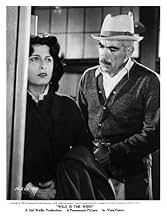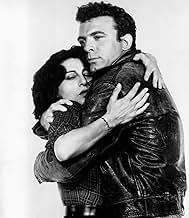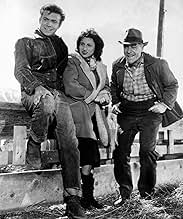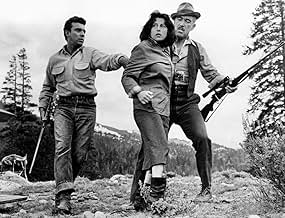IMDb RATING
6.6/10
1.2K
YOUR RATING
An immigrant Nevada rancher brings a woman from Italy to be his second wife, but when he neglects her she becomes involved with his trusted assistant.An immigrant Nevada rancher brings a woman from Italy to be his second wife, but when he neglects her she becomes involved with his trusted assistant.An immigrant Nevada rancher brings a woman from Italy to be his second wife, but when he neglects her she becomes involved with his trusted assistant.
- Nominated for 3 Oscars
- 2 wins & 8 nominations total
Fern Barry
- Party Guest
- (uncredited)
Franklyn Farnum
- Passenger at Airport
- (uncredited)
Ken Hooker
- Party Guest
- (uncredited)
Max Power
- Party Guest
- (uncredited)
Court Shepard
- Party Guest
- (uncredited)
Featured reviews
1976:I've just bought the new Bowie album "Station to station" and there's a track I find quite intriguing;it 's called "Wild is the wind" .Bowie gives a grandiose overblown rendition which I love from the first listening.The authors are Tiomkin/Washington;at the time I did not know them at all,and I must confess I barely knew Cukor (I'd seen "gaslight" and that was all).For thirty years ,I've been hoping to have the opportunity to see the movie whose song I've been playing for years (still am)
2005:After watching most of Cukor's filmography ,I finally saw "Wild is the wind" today.I was eagerly waiting for the song and there's more suspense cause the movie does not begin with the cast and credits.After the five-minute prologue that's it!Well it's terribly different.It's sung by Johnny Mathis (not Nina Simone)and I must admit...it's not what I expected.It's typically fifties melodrama song .
Now the movie.A movie which features Anna Magnani cannot be bad but I must say she's better in her native Italy (with Rossellini,Visconti,Pasolini et al).The Anthonys - Quinn the Eskimo and Anthony the Method - are good thespians and the story is interesting.An aging Italian whose wife passed away has her sister fly from Italy to marry her.And he begins to shape her personality, to break her as he does for the wild horse,in a nutshell,to make her a brand new Rosetta her first beloved wife.Symbolism is a bit overdone,ponderous (the horse,the ewe)but the actors can get away with it with gusto.Anna Magnani's metamorphosis during the movie is stunning,from a rather ugly gauche little woman with bags under her eyes to a bright Mediterranean beauty.Clint Eastwood might have remembered the lesson when he filmed Meryl Streep in his celebrated "bridges of Madison County" ,a return to the glorious fifties melodrama.
Not a great Cukor,but a must for fans of melodramas and/or Magnani.
2005:After watching most of Cukor's filmography ,I finally saw "Wild is the wind" today.I was eagerly waiting for the song and there's more suspense cause the movie does not begin with the cast and credits.After the five-minute prologue that's it!Well it's terribly different.It's sung by Johnny Mathis (not Nina Simone)and I must admit...it's not what I expected.It's typically fifties melodrama song .
Now the movie.A movie which features Anna Magnani cannot be bad but I must say she's better in her native Italy (with Rossellini,Visconti,Pasolini et al).The Anthonys - Quinn the Eskimo and Anthony the Method - are good thespians and the story is interesting.An aging Italian whose wife passed away has her sister fly from Italy to marry her.And he begins to shape her personality, to break her as he does for the wild horse,in a nutshell,to make her a brand new Rosetta her first beloved wife.Symbolism is a bit overdone,ponderous (the horse,the ewe)but the actors can get away with it with gusto.Anna Magnani's metamorphosis during the movie is stunning,from a rather ugly gauche little woman with bags under her eyes to a bright Mediterranean beauty.Clint Eastwood might have remembered the lesson when he filmed Meryl Streep in his celebrated "bridges of Madison County" ,a return to the glorious fifties melodrama.
Not a great Cukor,but a must for fans of melodramas and/or Magnani.
Anthony Quinn, (Gino) plays the role as a Italian/American sheep rancher who loses his wife and he decides to send for his dead wife's sister, Giola, (Anna Magnani) from Italy. When Giola arrives Gino gives her all kinds of presents, but is not close to her and always calls her by his dead wife's name. As the months go by, Giola becomes unhappy and feels neglected and still remains unmarried even though Gino calls her his wife. Bene, (Anthony Franciosa) is Gino's son and he becomes romantically involved with Giola and they have some very torrid love scenes. In one scene you see a sheep giving birth which adds a great deal to the reality of this very down to earth film which was directed by the famous director, George Cukor. Anna Magnani gave an outstanding performance and was nominated for an Acamedy Award for her great role. Enjoy.
This "women's director" was also no slouch with men, and he helps Anthony Quinn to perhaps his best performance. Quinn often overacted, and here, as a hearty, swaggering, brutish sheep rancher who brings his dead wife's sister (Anna Magnani) over from Italy to marry, he easily could have resorted to his usual bluster. But it's a very shaded portrayal, with seemingly conflicting elements of roughness and tenderness that make sense in the end. Magnani is predictably great, even singing well, and Tony Franciosa, as Quinn's adopted son who forms an O'Neill-like triangle (it does feel like "Desire Under the Elms," as another commenter noted), is excellent. The outdoorsiness and earthiness (you even see a lamb born, before your boggled eyes) are un-Cukorlike, but he handles them confidently; and while the symbolism gets a little heavy and Dmitri Tiomkin's music is a bit intrusive, it's an effective family melodrama with a beautifully underplayed fadeout.
I finally saw it too in a copy that appears to have been made from American Music Classics on cable at the time they were running movies uncut.
It's a well-acted film. The plot recalls O'Neill's Desire Under the Elms (filmed in 1958) and Sidney Howard's They Knew What They Wanted (filmed in 1940 with Charles Laughton and musicalized by Frank Loesser in The Most Happy fellow in 1956)--older man, mail order bride, affair between wife and younger man.
Very slow in the 1950s style but powerfully acted. Not the sort of film you'd expect from Cukor. Interesting facet to his career.
Also interesting to compare this film and Secret of San Vittorio which re-united Magnani and Quinn after 12 years--older and maybe toned down just a notch, with the Irish/Mexican Quinn again playing an Italian.
It's a well-acted film. The plot recalls O'Neill's Desire Under the Elms (filmed in 1958) and Sidney Howard's They Knew What They Wanted (filmed in 1940 with Charles Laughton and musicalized by Frank Loesser in The Most Happy fellow in 1956)--older man, mail order bride, affair between wife and younger man.
Very slow in the 1950s style but powerfully acted. Not the sort of film you'd expect from Cukor. Interesting facet to his career.
Also interesting to compare this film and Secret of San Vittorio which re-united Magnani and Quinn after 12 years--older and maybe toned down just a notch, with the Irish/Mexican Quinn again playing an Italian.
Cukor's "Wild is the Wind" seems to be a kind of tribute to Fellini's classic "La Strada." He made his film just a couple years later, and sets it up along very similar lines. He selects Antony Quinn, Zampano for Fellini, to be his male lead, Gino. And chooses the forceful Anna Magnani (Gioia) to equal Guiletta Masina's rather astonishing performance in the central role of Gelsomina in "La Strada."
Gino, the Nevada ranch owner, is the same kind of brutish, brooding hunk as is the strong man performer in "La Strada." They act in the masculine mode, determined, gusty, sometimes cruel, and in different senses, heroically alone. It is perhaps the poverty of the former and Gino's outsider status (Italian in Nevada) that open each up to change, and redemption. Each, however, is hardened against the actual woman--whoseservice he demands, and whose body he exploits--who offers that change.
Gioia, like her parallel, Gelsomina, is a replacement for a dead sister. Zampano purchases Gelsomina after his Rosa dies. Gino orders Gioia as a mail order bride to replace his wife who died after several desperate attempts to give him a child. Both women find themselves trapped in a feelingless, cold, abusive relationship, removed from human response and the natural world. They are owned--body and soul, and are, of course, interchangeable with their sisters.
But Gioia's resistance, like that of her predecessor, is central. Each woman is engaged, through a compelling range of small acts and facial expressions--they are FACES above all else--in a form of survival which doubles as opposition. What the man denies, they affirm, what he kills, they save. Each is strongly in touch with the needless suffering endured by humans and animals, and are sickened by the acts that cause it . And each is more bold than pleasing, more spirited than spiritual, and more troubling than tamed.
Both women have one or two male allies who bear some similarity. Bene (Tony Francioso) seems related to "La Strada"s tightrope walker (Richard Basehart): both men serving as alternative male's who have understanding and sympathy for these held women, and for the natural world they defend. They create space an breathing room--Bene's lust seems out of character. And then too each, in the end, leaves these women to the mercy of their oppressive situation. (Alberto, Gino's older brother, is perhaps a more practical ally than these two, however: it is his unusually direct and touching challenge to his brother that forces him to perceive Gioia as a person.)
All the major roles of La Strada are more convincing and consistent, and thus the ending is more powerful. Gino's redemption is also secured at a much lower cost than Zampano's, which has to do with the weaker script/plot than and not his less rigid nature. However "Wild is the Wind," given Cukor's Hollywood models and restraints, measures up quite well to Fellini's classic.
Gino, the Nevada ranch owner, is the same kind of brutish, brooding hunk as is the strong man performer in "La Strada." They act in the masculine mode, determined, gusty, sometimes cruel, and in different senses, heroically alone. It is perhaps the poverty of the former and Gino's outsider status (Italian in Nevada) that open each up to change, and redemption. Each, however, is hardened against the actual woman--whoseservice he demands, and whose body he exploits--who offers that change.
Gioia, like her parallel, Gelsomina, is a replacement for a dead sister. Zampano purchases Gelsomina after his Rosa dies. Gino orders Gioia as a mail order bride to replace his wife who died after several desperate attempts to give him a child. Both women find themselves trapped in a feelingless, cold, abusive relationship, removed from human response and the natural world. They are owned--body and soul, and are, of course, interchangeable with their sisters.
But Gioia's resistance, like that of her predecessor, is central. Each woman is engaged, through a compelling range of small acts and facial expressions--they are FACES above all else--in a form of survival which doubles as opposition. What the man denies, they affirm, what he kills, they save. Each is strongly in touch with the needless suffering endured by humans and animals, and are sickened by the acts that cause it . And each is more bold than pleasing, more spirited than spiritual, and more troubling than tamed.
Both women have one or two male allies who bear some similarity. Bene (Tony Francioso) seems related to "La Strada"s tightrope walker (Richard Basehart): both men serving as alternative male's who have understanding and sympathy for these held women, and for the natural world they defend. They create space an breathing room--Bene's lust seems out of character. And then too each, in the end, leaves these women to the mercy of their oppressive situation. (Alberto, Gino's older brother, is perhaps a more practical ally than these two, however: it is his unusually direct and touching challenge to his brother that forces him to perceive Gioia as a person.)
All the major roles of La Strada are more convincing and consistent, and thus the ending is more powerful. Gino's redemption is also secured at a much lower cost than Zampano's, which has to do with the weaker script/plot than and not his less rigid nature. However "Wild is the Wind," given Cukor's Hollywood models and restraints, measures up quite well to Fellini's classic.
Did you know
- TriviaThe only film that year nominated for Best Motion Picture Drama at the Golden Globes, and not Best Picture at the Academy Awards.
- ConnectionsFeatured in The Hollywood Collection: Anthony Quinn an Original (1990)
- SoundtracksWild Is the Wind
Music by Dimitri Tiomkin
Lyrics by Ned Washington
Performed by Johnny Mathis
(A Columbia Records Artist)
- How long is Wild Is the Wind?Powered by Alexa
Details
- Runtime1 hour 54 minutes
- Color
- Aspect ratio
- 1.85 : 1
Contribute to this page
Suggest an edit or add missing content


















